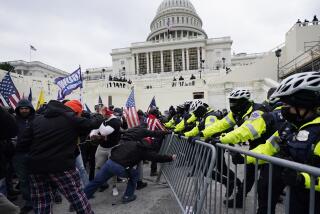Justices Question Federal Case Over Judge’s Sex Assault
WASHINGTON — The justices of the Supreme Court struggled Tuesday with a question that would seem to have an obvious answer to most Americans: Does a judge violate a constitutional right by sexually assaulting a woman in his chambers?
The dilemma facing the justices is that no federal law makes it a crime to commit rape. Such acts are punished under state law.
Federal civil rights laws make it illegal to sexually harass an employee, but this is only a civil statute that may result in money damages for the victim.
The issue before the court was whether a federal law passed after the Civil War covers sexual assaults committed in the county courthouse by a Tennessee judge.
The law in question was passed to give federal courts the power to intervene when Southern officials violated the rights of the newly freed slaves. It says: “Whoever, under color of any law . . . , willfully subjects any person in any state . . . to the deprivation of any rights, privileges or immunities secured or protected by the Constitution” is guilty of a federal crime.
On Tuesday, at least three justices voiced doubts about whether it could apply to Judge David Lanier of Dyersburg, Tenn., who was convicted under the federal law in 1992 of assaulting or raping five women and sentenced to 25 years in prison. The federal charges were brought against him because his brother served as the local district attorney and refused to prosecute him.
A year ago, however, a U.S. appeals court in Cincinnati threw out the case against the judge and ordered him freed. There is no “general constitutional right to be free of sexual assault,” wrote Judge Gilbert Merritt of Nashville.
Justice Antonin Scalia seemed to indicate Tuesday that he agrees.
Lanier was “not exerting state power” when he grabbed the women and forced them to engage in sex, Scalia said. “Suppose a state bureaucrat jumps up from his desk at the Department of Motor Vehicles and punches someone. . . . Is that a federal crime?” he asked, suggesting that his answer was no.
Justice Anthony M. Kennedy cited a hypothetical instance in which “a janitor leaps out of the closet at the courthouse and molests someone.” Is that public employee violating a constitutional right? he asked. He too seemed sure that the answer is no.
“There is a real element of vagueness in all this,” added Chief Justice William H. Rehnquist.
Though several other justices defended the prosecution of Lanier, the outcome appeared in doubt.
Clinton administration lawyers appealed the case (U.S. vs. Lanier, 95-1717), saying that the lower court decision leaves a large loophole in the law. They said that it makes no sense to apply the federal law to brutal assaults committed by jailers or police officers, as is commonly done, but not to a brutal rape committed by a judge.
Lanier’s Nashville attorney, Alfred Knight, argued that his client was not acting “under color of law” when he assaulted the women. Lanier was stripped of his office by the Legislature after his conviction.
But Justices Stephen G. Breyer and David H. Souter rejected that claim.
A decision in the case is expected in several months.
More to Read
Get the L.A. Times Politics newsletter
Deeply reported insights into legislation, politics and policy from Sacramento, Washington and beyond. In your inbox three times per week.
You may occasionally receive promotional content from the Los Angeles Times.











